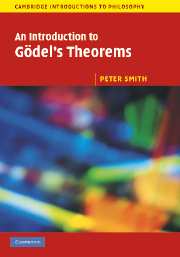Book contents
- Frontmatter
- Contents
- Preface
- 1 What Gödel's Theorems say
- 2 Decidability and enumerability
- 3 Axiomatized formal theories
- 4 Capturing numerical properties
- 5 The truths of arithmetic
- 6 Sufficiently strong arithmetics
- 7 Interlude: Taking stock
- 8 Two formalized arithmetics
- 9 What Q can prove
- 10 First-order Peano Arithmetic
- 11 Primitive recursive functions
- 12 Capturing p.r. functions
- 13 Q is p.r. adequate
- 14 Interlude: A very little about Principia
- 15 The arithmetization of syntax
- 16 PA is incomplete
- 17 Gödel's First Theorem
- 18 Interlude: About the First Theorem
- 19 Strengthening the First Theorem
- 20 The Diagonalization Lemma
- 21 Using the Diagonalization Lemma
- 22 Second-order arithmetics
- 23 Interlude: Incompleteness and Isaacson's conjecture
- 24 Gödel's Second Theorem for PA
- 25 The derivability conditions
- 26 Deriving the derivability conditions
- 27 Reflections
- 28 Interlude: About the Second Theorem
- 29 µ-Recursive functions
- 30 Undecidability and incompleteness
- 31 Turing machines
- 32 Turing machines and recursiveness
- 33 Halting problems
- 34 The Church–Turing Thesis
- 35 Proving the Thesis?
- 36 Looking back
- Further reading
- Bibliography
- Index
7 - Interlude: Taking stock
Published online by Cambridge University Press: 05 June 2012
- Frontmatter
- Contents
- Preface
- 1 What Gödel's Theorems say
- 2 Decidability and enumerability
- 3 Axiomatized formal theories
- 4 Capturing numerical properties
- 5 The truths of arithmetic
- 6 Sufficiently strong arithmetics
- 7 Interlude: Taking stock
- 8 Two formalized arithmetics
- 9 What Q can prove
- 10 First-order Peano Arithmetic
- 11 Primitive recursive functions
- 12 Capturing p.r. functions
- 13 Q is p.r. adequate
- 14 Interlude: A very little about Principia
- 15 The arithmetization of syntax
- 16 PA is incomplete
- 17 Gödel's First Theorem
- 18 Interlude: About the First Theorem
- 19 Strengthening the First Theorem
- 20 The Diagonalization Lemma
- 21 Using the Diagonalization Lemma
- 22 Second-order arithmetics
- 23 Interlude: Incompleteness and Isaacson's conjecture
- 24 Gödel's Second Theorem for PA
- 25 The derivability conditions
- 26 Deriving the derivability conditions
- 27 Reflections
- 28 Interlude: About the Second Theorem
- 29 µ-Recursive functions
- 30 Undecidability and incompleteness
- 31 Turing machines
- 32 Turing machines and recursiveness
- 33 Halting problems
- 34 The Church–Turing Thesis
- 35 Proving the Thesis?
- 36 Looking back
- Further reading
- Bibliography
- Index
Summary
Comparing incompleteness arguments
Our informal incompleteness theorems, Theorems 5.7 and 6.2, aren't the same as Gödel's own theorems. But they are cousins, and they seem quite terrific results to arrive at so very quickly.
Or are they? Everything depends, for a start, on whether the ideas of a ‘sufficiently expressive’ arithmetic language and a ‘sufficiently strong’ theory of arithmetic are in good order.
Now, as we've already briefly indicated in Section 2.2, there are a number of standard, well-understood, ways of formally refining the intuitive notion of decidability, ways that turn out to locate the same entirely definite and welldefined class of numerical properties and relations. In fact, these are the properties/relations whose application can be decided by a Turing machine. The specification ‘all decidable relations/properties of numbers’ can therefore be made perfectly clear. And hence the ideas of a ‘sufficiently expressive’ language (which expresses all decidable two-place numerical relations) and a ‘sufficiently strong’ theory (which captures all decidable properties of numbers) can also be made perfectly clear.
But by itself, that observation doesn't take us very far. For it leaves wide open the possibility that a language expressing all decidable relations or a theory that captures all decidable properties has to be very rich indeed. However, we announced right back in Section 1.2 that Gödel's own arguments rule out complete theories even of the truths of basic arithmetic.
- Type
- Chapter
- Information
- An Introduction to Gödel's Theorems , pp. 47 - 50Publisher: Cambridge University PressPrint publication year: 2007

